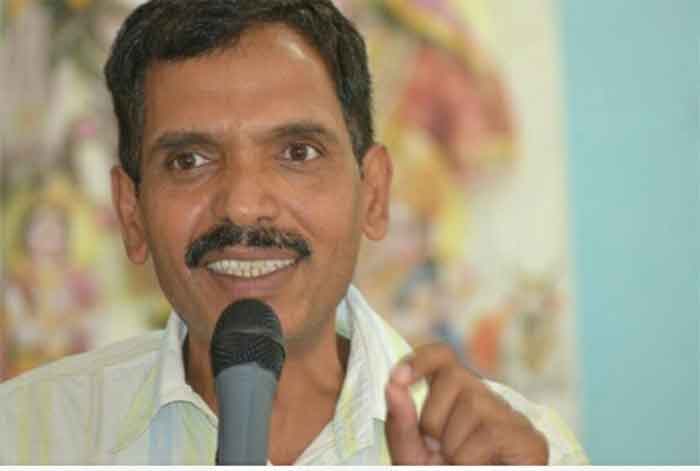
Trepan Singh Chauhan, a great activist-author of Uttarakhand, left us last year (2020) on August 13, leaving behind a rich legacy of activism and writings that will serve as a source of inspiration for a long time.
He died when he was only 48, and during his potentially most productive years he suffered from serious health problems and from the repression unleashed by authorities, while financial hardship was a continuing constraint for most of his life. Yet in the middle of all this, at a young age, his activism could achieve big breakthroughs in several difficult fields and he was able to produce literature of great quality which captures the realities as well as the yearnings of people and their struggles in Uttarakhand .
This could be possible only because of his indomitable will and his determination never to admit defeat. He faced jail sentences, personal loss, sudden advent of disability with equal courage and displayed great resilience in his ability to continue doing very creative work despite the situations around him becoming more and more difficult.
In the middle of many-sided difficulties he wrote his great novel Yamuna which created waves in the world of Hindi literature with its honest, sincrere, many-sided and vibrant depiction of very recent happenings while also capturing the beauty and small joys of daily life of hill-villages without ignoring its injustices and discriminations.
He had to toil as a child worker for some time but recovered from this difficult phase to participate in Chipko movement to protect forests and to continue his education, completing his post-graduation around the year 1995. Instead of looking for a secure job, he plunged almost immediately into the Right to Information and anti-corruption movements, creating a big stir in Bhilangana block of Tehri Garhwal district. This was also the beginning of Chetna Aandolan which was later active in several struggles and constructive activities.
This was followed by an even bigger struggle against a dam project which was found to be ignoring concerns of villagers’ welfare as well as safety and environmental concerns. This opposition resulted in repressive actions against him, including a prison sentence, and his family had to suffer a lot in this phase. However several demands of the struggle were conceded later. What is more, he could later take this struggle forward in other ways including trying to find ways of how people can take up micro hydel projects in ways that do not harm them and environment .
After some time he moved to Dehradun to start a union of daily wage workers which won important concessions for workers. Side by side he confronted forces of communalism and worked to advance dalit rights. The close relations with villages also continued and his wife Nirmala guided an alternative education program in which farmers, grass-cutters and crafts-persons of nearby villagers were also brought in as teachers. Humble women grass-cutters of Uttarakhand were honored in functions specially organized for this purpose in a unique effort initiated by Trepan.
It is remarkable that in the middle of all this busy social activism he could find the time to take up research work on highly relevant issues ( which also met his livelihood needs) and also to write novels, short stories, poems and songs of high literary value (in Hindi) which soon found a significant number of readers and admirers. His very first novel Yamuna was a big success.
This novel tells the story of a simple village woman and her friends against the background of the Uttarakhand statehood movement. The tradition of aanchalik upanyas ( novels with a strong regional authenticity) combined with concern for social justice, as initiated by Phanishwar Nath Renu in Hindi literature , is advanced further in this first novel of a young writer who describes the very contemporary reality of Uttarakhand villages in times of turmoil.
Here we see the endearing innocence and small joys of simple hill women, but we also see the harsh realities of rural life and the wider world inter-acting with this rural life. We see the beauty of traditional life but also its harsh, even cruel aspects. The writer shows the reality for what it is, so there is the beauty of rural hill life in this novel but there is also reflection on many serious problems.
Trepan followed this novel with three others—He Bwari, Srijan and Navyug and was working on the fifth novel, despite disease and serious disability, when he breathed his last. Courage, honesty and creativity—these were the defining features of his exceptionally accomplished life and this continued till his last, very difficult days in hospital. Even the doctors treating him admired his great courage.
I first met him at a meeting of Chipko friends and although he spoke little he immediately attracted attention because of his originality and sincerity. After this we kept speaking from time to time on phone. When at the peak of the dams controversy I travelled extensively in Garhwal with my daughter he came with his family members to meet us and we could spend a few hours together for the first time. But I realized that he was very modest in informing about his many-sided work and achievements. About some of his greater cheivements I came to know only later from others.
Several of the challenges he confronted with such great creativity and courage are increasing. His presence is certainly missed in these difficult times, but the legacy of ideas and inspiring work he has left behind remains very useful in meeting these increasing challenges.
Bharat Dogra is a freelance journalist who has been involved with several social movements. His latest book on Uttarakhand is titled Vimla and Sunderlal Bahuguna—Chipko Movement and the Struggle Against Tehri Dam Project.

















































